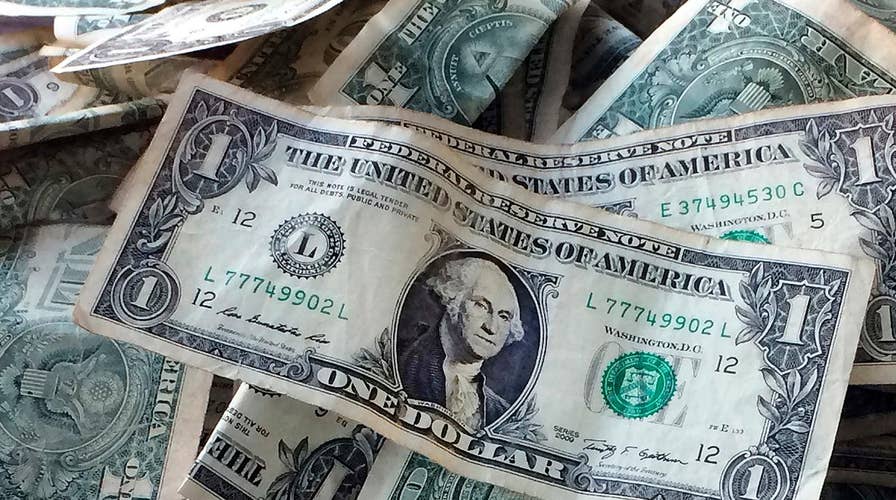Would a $15 minimum wage nationwide actually cost 1.3 million jobs?
What would be better for the economy? Economist Peter Morici weighs in.
It’s the wage increase that reduces families’ incomes.
That’s the verdict of the nonpartisan Congressional Budget Office (CBO) on a proposed $15 minimum wage, which the House of Representatives will vote on this week. Rather than putting money in workers’ pockets, the CBO finds that it could leave nearly 4 million of them without a job.
Democrats campaigned in 2018 on raising the minimum wage to $15 an hour; House Speaker Nancy Pelosi promised the 106 percent increase in the current minimum wage would be a top priority of a new Democratic Congress. It hasn’t worked out that way. Moderates in her caucus recoiled at an unprecedented wage mandate that would apply equally in Miami and Milford, Chicago and Cheboygan.
MINIMUM WAGE HIKES TRIGGER 'PAYROLL TSUNAMI,' AS SMALL BUSINESSES CUT BACK
These concerns are justified: Studies from Seattle and San Francisco found that experiments with a $15 minimum wage resulted in a spike in restaurant closures and a net reduction in many employees’ wages (whose loss of work hours offset their wage increase). Just last week, Restaurants Unlimited – a restaurant group with a majority of its locations in high-cost markets out west – filed for bankruptcy and closed six locations, citing the cost of a higher minimum wage.
Even one-time supporters of $15 have rethought the wisdom of the policy. Bill Phelps, co-founder of the franchise Wetzel's Pretzels, once praised California's $15 minimum wage – until he saw first-hand the negative impacts on businesses and employees.
Today, he says $15 is "not sustainable" and warns that future increases "are going to be bad for employees." Phelps is blunt in his warning to policymakers: "I think it is pushing it too far, too fast and I think employees will be hurt by those increases."
Concerns about the unintended consequences of raising the minimum wage aren’t new; what is new about the current wage debate is the size and scale of Democrats’ wage demand.
If a $30,000 full-time wage for entry-level work is harmful in higher-wage markets full of tourists and techies, what would it mean for rural areas with even less ability to pass along costs through higher prices? The CBO report provides an answer: By 2025, a $15 minimum wage would cost the country up to 3.7 million jobs – nearly three times the number of people who would be pulled out of poverty.
In a devastating blow for the policy’s proponents, the CBO concluded that a $15 minimum wage would reduce families’ real income by $9 billion by 2025. Yes, some workers would see an increase in their wages; but the lost jobs, higher prices, and added business costs would dwarf any beneficial poverty-reduction effects. According to the CBO, these negative impacts would be felt disproportionately by women (60 percent of the job losses) and by younger workers (half of the job losses).
Concerns about the unintended consequences of raising the minimum wage aren’t new; what is new about the current wage debate is the size and scale of Democrats’ wage demand.
Since the minimum wage was created by the Fair Labor Standards Act in 1938, it has averaged roughly $7.40 an hour – half of the current arbitrary $15 demand. The labor organizer who helped launch the Fight for $15 explained the less-than-scientific methodology: “Ten dollars was too low and $20 was too high, so we landed at $15.”
Ten dollars wasn't too low for Democrats in 2014; the party rallied around a $10.10 minimum wage that year, which would be $10.70 today adjusted for inflation. Some moderate members of the Democratic caucus acknowledge that the present $15 demand is disconnected from reality. “I don’t think $15 is some magical number,” said Rep. Terri Sewell, D-Ala. “If it really does no harm, then why not say $25 an hour?”
Unfortunately, Sewell and some of her colleagues have offered poorly-conceived solutions to address concerns about the poorly-conceived wage hike. These include a GAO "autopsy" report to quantify job losses after the fact, and a business tax credit to try and offset the cost of the hike.
CLICK HERE TO GET THE FOX NEWS APP
A similar sweetener was added to the last federal minimum wage increase which phased in between 2007 and 2009. It didn’t do much good: A study from economists at the University of California-San Diego found the increase still destroyed thousands of jobs.
Moderate Democrats have a choice to make: They can live up to their “pragmatic” label and listen to the nonpartisan economists at the CBO, or they can ignore the CBO and vote for a reckless policy that puts their constituents’ jobs in danger.









































